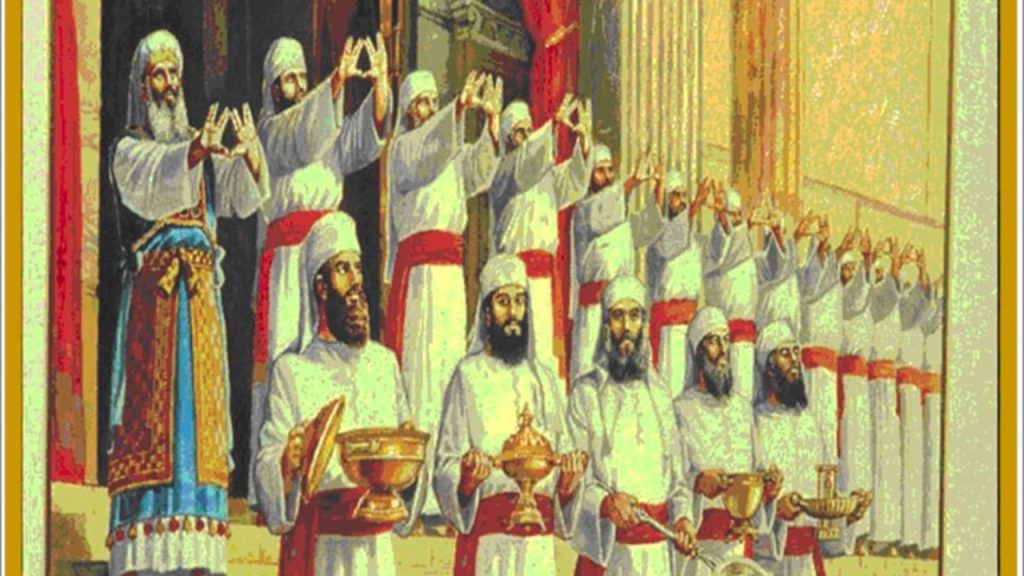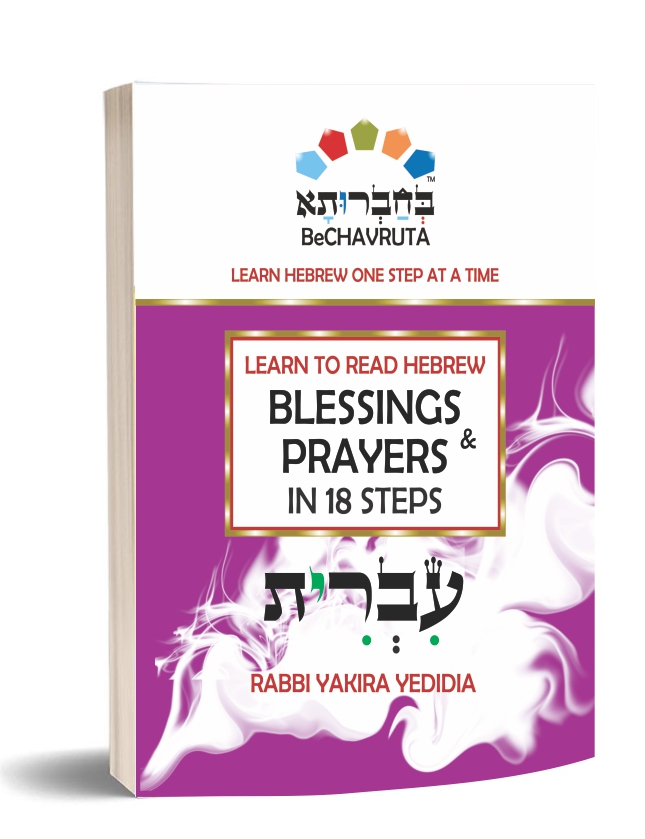In a nutshell
Parshah Nitzavim is read on the last Shabbat of the year, the last Shabbat before Rosh Hashnah,
the last Shabbat before the month of Tishrei. Unlike the last Shabbat before each month, when we bless the new month, Tishrei, the first month of the Jewish calendar, is the only month we’re not blessing. Why? according to chasidut, we don’t bless the month of Tishrei because God is blessing this month himself.
אַתֶּ֨ם נִצָּבִ֤ים הַיּוֹם֙ כֻּלְּכֶ֔ם לִפְנֵ֖י יְהֹוָ֣ה אֱלֹהֵיכֶ֑ם רָאשֵׁיכֶ֣ם שִׁבְטֵיכֶ֗ם זִקְנֵיכֶם֙ וְשֹׁ֣טְרֵיכֶ֔ם כֹּ֖ל אִ֥ישׁ יִשְׂרָאֵֽל׃
You stand this day, all of you, before the LORD your God—your tribal heads, your elders and your officials, all the men of Israel. Based on Targum on Iyov 2:1: “You (the Jewish people) stand this day”, “this day” refers to Rosh Hashanah, the day of judgement, when the Jewish people remain nitzavim, standing, indicating they pass the judgement.
טַפְּכֶ֣ם נְשֵׁיכֶ֔ם וְגֵ֣רְךָ֔ אֲשֶׁ֖ר בְּקֶ֣רֶב מַחֲנֶ֑יךָ מֵחֹטֵ֣ב עֵצֶ֔יךָ עַ֖ד שֹׁאֵ֥ב מֵימֶֽיךָ׃
your children, your wives, even the stranger within your camp, from wood chopper to water drawer—
Return to God
כִּ֣י תִשְׁמַ֗ע בְּקוֹל֙ יְהֹוָ֣ה אֱלֹהֶ֔יךָ לִשְׁמֹ֤ר מִצְוֺתָיו֙ וְחֻקֹּתָ֔יו הַכְּתוּבָ֕ה בְּסֵ֥פֶר הַתּוֹרָ֖ה הַזֶּ֑ה כִּ֤י תָשׁוּב֙ אֶל־יְהֹוָ֣ה אֱלֹהֶ֔יךָ בְּכׇל־לְבָבְךָ֖ וּבְכׇל־נַפְשֶֽׁךָ׃ {ס}
since you will be heeding the LORD your God and keeping His commandments and laws that are recorded in this book of the Teaching—once you return to the LORD your God with all your heart and soul.
כִּ֚י הַמִּצְוָ֣ה הַזֹּ֔את אֲשֶׁ֛ר אָנֹכִ֥י מְצַוְּךָ֖ הַיּ֑וֹם לֹא־נִפְלֵ֥את הִוא֙ מִמְּךָ֔ וְלֹ֥א רְחֹקָ֖ה הִֽוא׃
Surely, this Instruction which I enjoin upon you this day is not too baffling for you, nor is it beyond reach.
לֹ֥א בַשָּׁמַ֖יִם הִ֑וא לֵאמֹ֗ר מִ֣י יַעֲלֶה־לָּ֤נוּ הַשָּׁמַ֙יְמָה֙ וְיִקָּחֶ֣הָ לָּ֔נוּ וְיַשְׁמִעֵ֥נוּ אֹתָ֖הּ וְנַעֲשֶֽׂנָּה׃
It is not in the heavens, that you should say, “Who among us can go up to the heavens and get it for us and impart it to us, that we may observe it?”
וְלֹא־מֵעֵ֥בֶר לַיָּ֖ם הִ֑וא לֵאמֹ֗ר מִ֣י יַעֲבׇר־לָ֜נוּ אֶל־עֵ֤בֶר הַיָּם֙ וְיִקָּחֶ֣הָ לָּ֔נוּ וְיַשְׁמִעֵ֥נוּ אֹתָ֖הּ וְנַעֲשֶֽׂנָּה׃
Neither is it beyond the sea, that you should say, “Who among us can cross to the other side of the sea and get it for us and impart it to us, that we may observe it?”
כִּֽי־קָר֥וֹב אֵלֶ֛יךָ הַדָּבָ֖ר מְאֹ֑ד בְּפִ֥יךָ וּבִֽלְבָבְךָ֖ לַעֲשֹׂתֽוֹ׃ {ס}
No, the thing is very close to you, in your mouth and in your heart, to observe it.
Fundamental principles of the Jewish faith
The unity of Israel: “You stand today”, The future redemption: Moses warns of Israel abandoning G‑d’s laws, but in the end, “You will return to the L‑rd your G‑d “, how simple it is to follow God: “For the mitzvah which I command you this day, it is not beyond you, nor is it remote from you. It is not in heaven . . . It is not across the sea . . . Rather, it is very close to you, in your mouth, in your heart, that you may do it”, and the freedom of choice: “I command you this day to love G‑d, to walk in His ways and to keep His commandments . . . Life and death I have set before you, blessing and curse. And you shall choose life.”
“Everything is determined, but the choice is yours”
In Pirkei Avot we learn “Hakol Tzafuy Vehareshut Netunah” meaning “Everything is determined, but the choice is yours”, sounds like a paradox. If everything is determined, then how come I have a choice? Modern science is now aligned with the fundamental concept in Torah. The theory of Quantum Physics explains that everything we see in this world is just a matter of perspective; nothing is confirmed, it is neither big or small, black or white, right or left, up or down. “Hakol Tzafuy Vehareshut Netunah” meaning we are the determining factor to what possibilities can manifest.
Thinking, feeling and doing. Each and every one of us has that capacity of vision. It is the very essence of our souls and it lies beneath all we think, feel and do. Going through the past year and a half, times of uncertainty and danger, is it is not easy for any of us.
How do you see the world? What kind of a place do you believe the world to be? Those who see the world in a beautiful, positive way tend to see the beauty in everything. It doesn’t mean that they are not aware of the negative aspects of life, however, in spite of everything, they still chose to see life in a positive light.
As we welcome the new Jewish year, may we all manifest positivity in the world by thinking good thoughts, feeling good feelings, doing and being good to ourselves and to others. Kol tuv.

ORDER RABBI YAKIRA NEW BOOK “LEARN TO READ HEBREW IN 18 STEPS”
The 613 Mitzvot
The commandment of the tzitzit. The word tzitzit is related to the root word lehatzitz- to look, therefore a tzitzit is an object at which we look . In addition, the word tzitzit numerical value is 600. The tzitzit has 8 threads and 5 double knots in each corner (8+5=13), thus a tzitzit represents the 613 mitzvot in the Torah.
In The Torah there are 613 commandments, mitzvot, also known as the Law of Moses (תרי״ג מצוות, taryag mitzvot). The 613 mitzvot are first recorded in the 3rd century CE, when Rabbi Simlai mentioned it in a sermon that is recorded in Talmud Makkot 23b.
The 613 commandments include 248 “positive commandments”, to perform an act (mitzvot aseh), and 365 “negative commandments”, to abstain from certain acts (mitzvot lo taaseh). The negative commandments number 365, which coincides with the number of days in the solar year, and the positive commandments number 248, a number ascribed to the number of bones and main organs in the human body.
Though the number 613 is mentioned in the Talmud, its real significance increased in later medieval rabbinic literature, including many works listing or arranged by the mitzvot. The most famous of these was an enumeration of the 613 commandments by Maimonides, The Rambam.
Many of the mitzvot cannot be observed now, following the destruction of the Second Temple, although they still retain religious significance. According to one standard reckoning, there are 77 positive and 194 negative commandments that can be observed today, of which there are 26 commands that apply only within the Land of Israel. Furthermore, there are some time-related commandments from which women are exempt (examples include shofar, sukkah, lulav, tzitzit and tefillin). Some depend on the special status of a person in Judaism (such as kohanim), while others apply only to men or only to women. According to Rambam Organized by Parshah. based on Wikipedia and http://www.vaadrv.org/rambam613mitzvot.asp ONE BIG IMPORTANT NOTE WHEN USING THIS LISTING: This listing is not all inclusive. Rambam may site multiple sources for a mitzvah is his works but this list currently only gives one source for each mitzvah.
WOULD YOU LIKE TO READ HEBREW?
THE BEST TIME TO PLANT A TREE WAS 20 YEARS AGO. THE SECOND BEST TIME IS NOW!
Take your first step, and in as little as 9 hours of BeCHAVRUTA Crash Course Book, you will be able to Read Hebrew Fluently & Accurately like a Pro!
ORDER RABBI YAKIRA NEW BOOK “LEARN TO READ HEBREW IN 18 STEPS”
“Original, fun, and effective, this is a superb way to learn to read Hebrew.“- DENNIS PRAGER
“A clear, lucid and immensely helpful guide to learning Hebrew. Takes the reader by the hand and introduces the holy tongue in living color.“-RABBI DAVID WOLPE
“An instant classic! Rabbi Yakira has written a primer on Hebrew that is both enchanting & colorful. It is sure to capture the interest of students & magically introduce them to the Hebrew language!”-RABBI DR DAVID ELLENSON
The Priestly Blessing
Check out YedidYah “The Priestly Blessing” Birkat Hakohanim. Music by Rabbi Yakira Yedidia https://youtu.be/YNE11QdEMN0
יְבָרֶכְךָ יהוה, וְיִשְׁמְרֶךָ- May the LORD bless you and guard you
יָאֵר יהוה פָּנָיו אֵלֶיךָ, וִיחֻנֶּךָּ -May the LORD make His face shed light upon you and be gracious unto you
יִשָּׂא יהוה פָּנָיו אֵלֶיךָ, וְיָשֵׂם לְךָ שָׁלוֹם- May the LORD lift up His face unto you and give you peace
Yevarechecha Adonai, V’Yishmerecha
Ya’er Adonai Panav Eleycha, ViChoneka
Yisa Adonai Panav Eleycha, V’Yasem Lecha Shalom
(Number 6:24-26).
Check out YedidYah “The Priestly Blessing” Birkat Hakohanim. Music by Rabbi Yakira Yedidia https://youtu.be/YNE11QdEMN0
Check out YedidYah Psalm 96 “Yiram Hayam” Music by Rabbi Yakira Yedidia https://youtu.be/aTBD4i9nvXw

This blog article was inspired by chabbad.org, Sefaria.org, Wikipedia.org,



